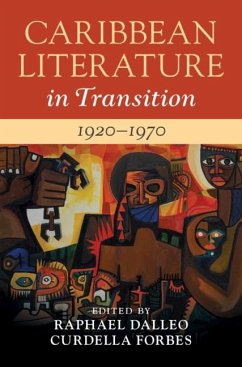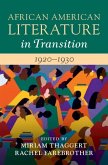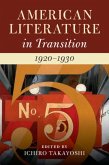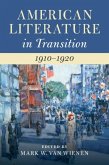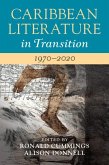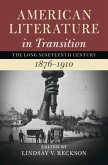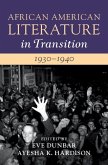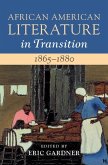Caribbean Literature in Transition, 1920-1970: Volume 2 (eBook, PDF)
Redaktion: Dalleo, Raphael
65,95 €
65,95 €
inkl. MwSt.
Sofort per Download lieferbar

33 °P sammeln
65,95 €
Als Download kaufen

65,95 €
inkl. MwSt.
Sofort per Download lieferbar

33 °P sammeln
Jetzt verschenken
Alle Infos zum eBook verschenken
65,95 €
inkl. MwSt.
Sofort per Download lieferbar
Alle Infos zum eBook verschenken

33 °P sammeln
Caribbean Literature in Transition, 1920-1970: Volume 2 (eBook, PDF)
Redaktion: Dalleo, Raphael
- Format: PDF
- Merkliste
- Auf die Merkliste
- Bewerten Bewerten
- Teilen
- Produkt teilen
- Produkterinnerung
- Produkterinnerung

Bitte loggen Sie sich zunächst in Ihr Kundenkonto ein oder registrieren Sie sich bei
bücher.de, um das eBook-Abo tolino select nutzen zu können.
Hier können Sie sich einloggen
Hier können Sie sich einloggen
Sie sind bereits eingeloggt. Klicken Sie auf 2. tolino select Abo, um fortzufahren.

Bitte loggen Sie sich zunächst in Ihr Kundenkonto ein oder registrieren Sie sich bei bücher.de, um das eBook-Abo tolino select nutzen zu können.
This volume revisits important moments from 1920 to 1970, key years for Caribbean literature, to open up new perspectives.
- Geräte: PC
- mit Kopierschutz
- eBook Hilfe
- Größe: 5.26MB
- FamilySharing(5)
Andere Kunden interessierten sich auch für
![African American Literature in Transition, 1920-1930: Volume 9 (eBook, PDF) African American Literature in Transition, 1920-1930: Volume 9 (eBook, PDF)]() African American Literature in Transition, 1920-1930: Volume 9 (eBook, PDF)68,95 €
African American Literature in Transition, 1920-1930: Volume 9 (eBook, PDF)68,95 €![American Literature in Transition, 1920-1930 (eBook, PDF) American Literature in Transition, 1920-1930 (eBook, PDF)]() American Literature in Transition, 1920-1930 (eBook, PDF)90,95 €
American Literature in Transition, 1920-1930 (eBook, PDF)90,95 €![American Literature in Transition, 1910-1920 (eBook, PDF) American Literature in Transition, 1910-1920 (eBook, PDF)]() American Literature in Transition, 1910-1920 (eBook, PDF)90,95 €
American Literature in Transition, 1910-1920 (eBook, PDF)90,95 €![Caribbean Literature in Transition, 1970-2020: Volume 3 (eBook, PDF) Caribbean Literature in Transition, 1970-2020: Volume 3 (eBook, PDF)]() Caribbean Literature in Transition, 1970-2020: Volume 3 (eBook, PDF)65,95 €
Caribbean Literature in Transition, 1970-2020: Volume 3 (eBook, PDF)65,95 €![American Literature in Transition, 1876-1910: Volume 4 (eBook, PDF) American Literature in Transition, 1876-1910: Volume 4 (eBook, PDF)]() American Literature in Transition, 1876-1910: Volume 4 (eBook, PDF)68,95 €
American Literature in Transition, 1876-1910: Volume 4 (eBook, PDF)68,95 €![African American Literature in Transition, 1930-1940: Volume 10 (eBook, PDF) African American Literature in Transition, 1930-1940: Volume 10 (eBook, PDF)]() African American Literature in Transition, 1930-1940: Volume 10 (eBook, PDF)68,95 €
African American Literature in Transition, 1930-1940: Volume 10 (eBook, PDF)68,95 €![African American Literature in Transition, 1865-1880: Volume 5, 1865-1880 (eBook, PDF) African American Literature in Transition, 1865-1880: Volume 5, 1865-1880 (eBook, PDF)]() African American Literature in Transition, 1865-1880: Volume 5, 1865-1880 (eBook, PDF)68,95 €
African American Literature in Transition, 1865-1880: Volume 5, 1865-1880 (eBook, PDF)68,95 €-
-
-
This volume revisits important moments from 1920 to 1970, key years for Caribbean literature, to open up new perspectives.
Dieser Download kann aus rechtlichen Gründen nur mit Rechnungsadresse in A, B, BG, CY, CZ, D, DK, EW, E, FIN, F, GR, HR, H, IRL, I, LT, L, LR, M, NL, PL, P, R, S, SLO, SK ausgeliefert werden.
Produktdetails
- Produktdetails
- Verlag: Cambridge University Press
- Erscheinungstermin: 14. Januar 2021
- Englisch
- ISBN-13: 9781108851961
- Artikelnr.: 66183121
- Verlag: Cambridge University Press
- Erscheinungstermin: 14. Januar 2021
- Englisch
- ISBN-13: 9781108851961
- Artikelnr.: 66183121
- Herstellerkennzeichnung Die Herstellerinformationen sind derzeit nicht verfügbar.
Introduction Raphael Dalleo and Curdella Forbes
Part I. Literary and Generic Transitions: 1. Writing at the end of empire Erin M. Fehskens
2. Questioning Modernism: the 1950s-1960s Mary Lou Emery
3. Daily decolonization: poetry, periodicals, and newspaper publishing Ben Etherington
4. Towards a national theatre Jason Allen-Paisant
5. Orature, performance, and the oral-scribal interface Carol Bailey
6. Explorations of the self Merle Collins
Part II. Cultural and Political Transitions: 7. Debating language Carolyn Cooper
8. Periodical culture Claire Irving
9. Decolonizing education: literature, the school system, and the imperatives of political independence Ian Robertson
10. Imaginaries of citizenship and the state Michael Niblett
11. Postcolonial stirrings: the crisis of nationalism Laurie R. Lambert
Part III. The Caribbean Region in Transition: 12. A moving centre: the Caribbean in Britain J. Dillon Brown
13. Canadian routes Michael A. Bucknor
14. New empires: the Caribbean and the United States Imani D. Owens
15. Africa and the Caribbean: recrossing the Atlantic Simon Gikandi
16. Cross-Caribbean dialogues I: Hispanophone Amanda T. Perry
17. Cross-Caribbean dialogues II: Francophone Raphael Dalleo
Part IV. Critical Transitions: 18. Forging the critical canon Glyne Griffith
19. Forgotten trailblazers Antonia Macdonald
20. Recuperating women writers Anthea Morrison
21. Rhizomatic genealogies: Jean Rhys as literary foremother Reed Caswell Aiken
22. Writing Indo-Caribbean masculinity Lisa Outar
23. Writing and reading sex and sexuality Margaret Grace Love.
Part I. Literary and Generic Transitions: 1. Writing at the end of empire Erin M. Fehskens
2. Questioning Modernism: the 1950s-1960s Mary Lou Emery
3. Daily decolonization: poetry, periodicals, and newspaper publishing Ben Etherington
4. Towards a national theatre Jason Allen-Paisant
5. Orature, performance, and the oral-scribal interface Carol Bailey
6. Explorations of the self Merle Collins
Part II. Cultural and Political Transitions: 7. Debating language Carolyn Cooper
8. Periodical culture Claire Irving
9. Decolonizing education: literature, the school system, and the imperatives of political independence Ian Robertson
10. Imaginaries of citizenship and the state Michael Niblett
11. Postcolonial stirrings: the crisis of nationalism Laurie R. Lambert
Part III. The Caribbean Region in Transition: 12. A moving centre: the Caribbean in Britain J. Dillon Brown
13. Canadian routes Michael A. Bucknor
14. New empires: the Caribbean and the United States Imani D. Owens
15. Africa and the Caribbean: recrossing the Atlantic Simon Gikandi
16. Cross-Caribbean dialogues I: Hispanophone Amanda T. Perry
17. Cross-Caribbean dialogues II: Francophone Raphael Dalleo
Part IV. Critical Transitions: 18. Forging the critical canon Glyne Griffith
19. Forgotten trailblazers Antonia Macdonald
20. Recuperating women writers Anthea Morrison
21. Rhizomatic genealogies: Jean Rhys as literary foremother Reed Caswell Aiken
22. Writing Indo-Caribbean masculinity Lisa Outar
23. Writing and reading sex and sexuality Margaret Grace Love.
Introduction Raphael Dalleo and Curdella Forbes
Part I. Literary and Generic Transitions: 1. Writing at the end of empire Erin M. Fehskens
2. Questioning Modernism: the 1950s-1960s Mary Lou Emery
3. Daily decolonization: poetry, periodicals, and newspaper publishing Ben Etherington
4. Towards a national theatre Jason Allen-Paisant
5. Orature, performance, and the oral-scribal interface Carol Bailey
6. Explorations of the self Merle Collins
Part II. Cultural and Political Transitions: 7. Debating language Carolyn Cooper
8. Periodical culture Claire Irving
9. Decolonizing education: literature, the school system, and the imperatives of political independence Ian Robertson
10. Imaginaries of citizenship and the state Michael Niblett
11. Postcolonial stirrings: the crisis of nationalism Laurie R. Lambert
Part III. The Caribbean Region in Transition: 12. A moving centre: the Caribbean in Britain J. Dillon Brown
13. Canadian routes Michael A. Bucknor
14. New empires: the Caribbean and the United States Imani D. Owens
15. Africa and the Caribbean: recrossing the Atlantic Simon Gikandi
16. Cross-Caribbean dialogues I: Hispanophone Amanda T. Perry
17. Cross-Caribbean dialogues II: Francophone Raphael Dalleo
Part IV. Critical Transitions: 18. Forging the critical canon Glyne Griffith
19. Forgotten trailblazers Antonia Macdonald
20. Recuperating women writers Anthea Morrison
21. Rhizomatic genealogies: Jean Rhys as literary foremother Reed Caswell Aiken
22. Writing Indo-Caribbean masculinity Lisa Outar
23. Writing and reading sex and sexuality Margaret Grace Love.
Part I. Literary and Generic Transitions: 1. Writing at the end of empire Erin M. Fehskens
2. Questioning Modernism: the 1950s-1960s Mary Lou Emery
3. Daily decolonization: poetry, periodicals, and newspaper publishing Ben Etherington
4. Towards a national theatre Jason Allen-Paisant
5. Orature, performance, and the oral-scribal interface Carol Bailey
6. Explorations of the self Merle Collins
Part II. Cultural and Political Transitions: 7. Debating language Carolyn Cooper
8. Periodical culture Claire Irving
9. Decolonizing education: literature, the school system, and the imperatives of political independence Ian Robertson
10. Imaginaries of citizenship and the state Michael Niblett
11. Postcolonial stirrings: the crisis of nationalism Laurie R. Lambert
Part III. The Caribbean Region in Transition: 12. A moving centre: the Caribbean in Britain J. Dillon Brown
13. Canadian routes Michael A. Bucknor
14. New empires: the Caribbean and the United States Imani D. Owens
15. Africa and the Caribbean: recrossing the Atlantic Simon Gikandi
16. Cross-Caribbean dialogues I: Hispanophone Amanda T. Perry
17. Cross-Caribbean dialogues II: Francophone Raphael Dalleo
Part IV. Critical Transitions: 18. Forging the critical canon Glyne Griffith
19. Forgotten trailblazers Antonia Macdonald
20. Recuperating women writers Anthea Morrison
21. Rhizomatic genealogies: Jean Rhys as literary foremother Reed Caswell Aiken
22. Writing Indo-Caribbean masculinity Lisa Outar
23. Writing and reading sex and sexuality Margaret Grace Love.
